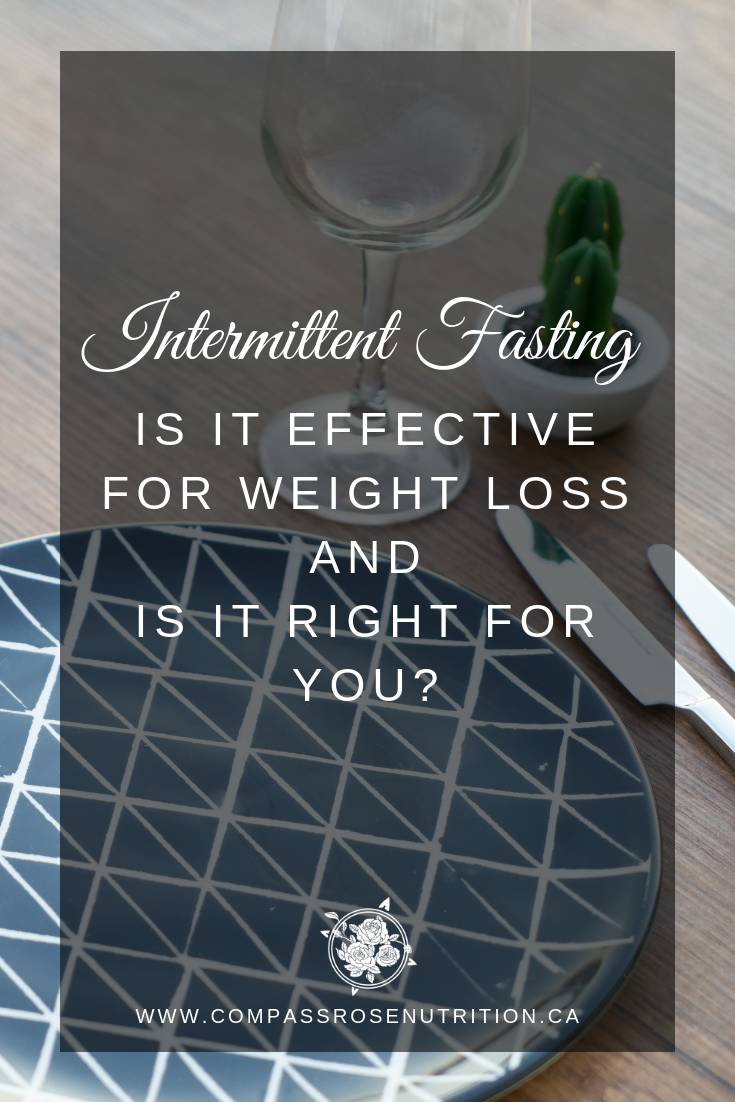Intermittent fasting 101: What is it and will it help me lose weight?
This is such a common question I have been getting lately, so I thought I would put it all down in a blog. This should help answer your questions on intermittent fasting and if it’s right for you.
In a nutshell, intermittent fasting is just that: fasting intermittently.
It's limiting calorie intake during certain hours/day or days/week. It's more of an eating pattern than a diet. It limits when to eat, and not so much what to eat. And that’s part of it’s appeal to people who don’t want to count calories or use their food log to track everything.
Some people would say that it's a more natural way to eat because humans evolved without refrigerators, drive-throughs, or 24-hour convenience stores. We now have access to food (including junk food) all day long, so eating several meals per day plus snacks may be less natural than fasting from time to time.
There are lots of variations on this theme and there isn’t one standard when people mention fasting. They include:
16/8 which is 16 hours of fasting, and eating only within the other 8 hours (often 1:00 pm. - 9:00 p.m.);
5:2 days of fasting, where you eat regularly for 5 days of the week, then take in just 500-600 calories/day for the other 2 (non-consecutive) days.
I have heard of quite a few variations, so you may have as well.
Is Intermittent fasting effective for weight loss?
Intermittent fasting can help to lose weight because it can help you to eat fewer calories, and burn more calories too.
Lots of people say they have success with it. But what do the studies say?
According to one review study, intermittent fasting helped people to lose 3-8% of their weight over 3-24 weeks. In this study, people also lost 4-7% of their waist circumference (i.e., belly fat).
Another study of 100 people with obesity showed that after a year, the people who fasted on alternate days lost more weight than people who didn’t change their eating pattern. But, (and here’s where it’s interesting) they didn’t lose any more weight than those on a calorie restricted diet. Out of the people who were to follow the intermittent fasting protocol, 38% of them dropped out.
Sticking with a diet or healthy eating program is one of the keys to weight loss success. So, if you can’t stay with a weight-loss diet, you’re less likely to lose the weight and keep it off.
Things to consider before you try intermittent fasting
Intermittent fasting is not for everyone. People who are underweight, or have eating disorders shouldn’t fast. Neither should women who are pregnant, trying to get pregnant, or are breastfeeding.
Certain medical conditions can be worsened with longer periods of fasting. Also, people taking certain medications can be prone to side effects with intermittent fasting as well.
If you have blood sugar imbalances or diabetes, then fasting is not recommended as your blood sugar can drop to dangerously low levels. Many people have blood sugar imbalances even if they do not know it.
One of the reasons people drop out of the intermittent fasting eating pattern is that it’s hard to stick with the fasting part. They eat more than the allowed (low-level of) calories when they’re supposed to be fasting. And when they finish fasting, they may overindulge due to the reaction of the appetite hormones and hunger drive while fasting. None of these will help with weight loss.
Also, the hours and days of fasting can be very difficult. So having strong social support will be key to those intermittent periods of fasting. Sticking to a (healthy, nutrient-dense) weight loss diet is the key to success, and intermittent fasting can be difficult for many people to stick with.
Conclusion
Intermittent fasting is a weight loss trend that seems to work for some people. It can help to lose weight and reduce belly fat. But, it isn't safe for everyone and in most cases is quite difficult to stick with long term. I would rather you find a healthy long term approach to eating.
Many people should not try intermittent fasting because it can be risky. It can also be difficult to stick with.
For the best chance of long-term weight loss success, finding a diet, you can stick with is key.
My personal opinion? Well, taking a short break from digestion is good for you once in awhile, but you are doing that at night, while you sleep. In the day, I feel like most of us need more nourishing food, not less.
What about you - Have you or someone you know tried intermittent fasting? What were the results? Let me know in the comments below.
Instead of intermittent fasting try out the 5 Day Sugar Free Challenge. Sign up now and let’s get healthy.




